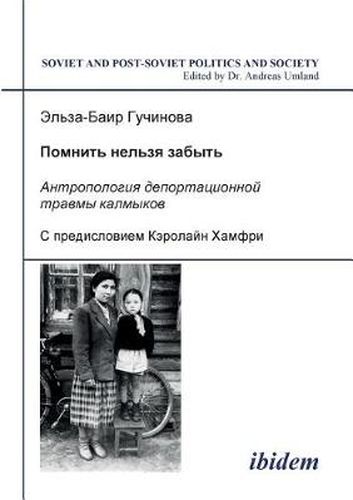Readings Newsletter
Become a Readings Member to make your shopping experience even easier.
Sign in or sign up for free!
You’re not far away from qualifying for FREE standard shipping within Australia
You’ve qualified for FREE standard shipping within Australia
The cart is loading…






This title is printed to order. This book may have been self-published. If so, we cannot guarantee the quality of the content. In the main most books will have gone through the editing process however some may not. We therefore suggest that you be aware of this before ordering this book. If in doubt check either the author or publisher’s details as we are unable to accept any returns unless they are faulty. Please contact us if you have any questions.
This study deals with the anthropology of the deportation trauma as experienced by the Kalmyks (1943-1956) and how it affects national identification. It shows the stigmatisation of Kalmyk identity in the years of deportation and response of the ethnic group to deprivation. The ever changing discourse of the Kalmyk issue, and political use of the trauma also receive attention.The study is innovative in Russian anthropology as it is the first anthropological study of the Kalmyk deportation as well as of the consequences of the trauma, and as it provides comparative insight by making use of similar experience of deprivation of other ethnic groups. The monograph contains a valuable corps of sources, especially oral, including analyses of folk songs and oral narratives. The novelty of the study also lies in that it applies gender methodology to the analysis of adaptation of men and women to extreme conditions of life and considers gender-specific differences in mechanisms of memory, recollection and oral narration. The monograph closes a gap in the study of collective and individual strategies of survival in conditions of deportation in Siberia and Central Asia. It demonstrates the existence of stigmatised ethnicity in the USSR.Among the conclusions the author arrives are that the Buddhist tradition played an important role in the way historic trauma was perceived by the Kalmyks, and that there was a factor of phenotypic difference leading Kalmyks in extreme conditions to strive to dissolve in the social environment using every chance to prove loyalty to the state. This left little chance for specific Kalmyk cultural features to resurge outside the home sphere. There is evidence that the trauma is something most Kalmyks have overcome. Its still deliberate accentuation appears to be pragmatically aimed into the future.
$9.00 standard shipping within Australia
FREE standard shipping within Australia for orders over $100.00
Express & International shipping calculated at checkout
This title is printed to order. This book may have been self-published. If so, we cannot guarantee the quality of the content. In the main most books will have gone through the editing process however some may not. We therefore suggest that you be aware of this before ordering this book. If in doubt check either the author or publisher’s details as we are unable to accept any returns unless they are faulty. Please contact us if you have any questions.
This study deals with the anthropology of the deportation trauma as experienced by the Kalmyks (1943-1956) and how it affects national identification. It shows the stigmatisation of Kalmyk identity in the years of deportation and response of the ethnic group to deprivation. The ever changing discourse of the Kalmyk issue, and political use of the trauma also receive attention.The study is innovative in Russian anthropology as it is the first anthropological study of the Kalmyk deportation as well as of the consequences of the trauma, and as it provides comparative insight by making use of similar experience of deprivation of other ethnic groups. The monograph contains a valuable corps of sources, especially oral, including analyses of folk songs and oral narratives. The novelty of the study also lies in that it applies gender methodology to the analysis of adaptation of men and women to extreme conditions of life and considers gender-specific differences in mechanisms of memory, recollection and oral narration. The monograph closes a gap in the study of collective and individual strategies of survival in conditions of deportation in Siberia and Central Asia. It demonstrates the existence of stigmatised ethnicity in the USSR.Among the conclusions the author arrives are that the Buddhist tradition played an important role in the way historic trauma was perceived by the Kalmyks, and that there was a factor of phenotypic difference leading Kalmyks in extreme conditions to strive to dissolve in the social environment using every chance to prove loyalty to the state. This left little chance for specific Kalmyk cultural features to resurge outside the home sphere. There is evidence that the trauma is something most Kalmyks have overcome. Its still deliberate accentuation appears to be pragmatically aimed into the future.